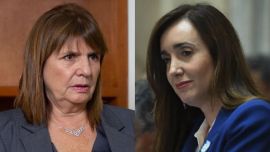For the first time in more than 200 days of quarantine in Argentina, the focus of the coronavirus pandemic truly shifted inland yesterday, as President Alberto Fernández announced a host of new measures.
Declaring that he would be ”rolling up his sleeves with the governors to attack this damned virus in every corner of the country,” the president said Friday that his government would introduce or extend restrictions on the circulation of movement in in no less than 18 provinces of Argentina’s 23 provinces for the next 14 days, as the country struggles to cope with the spread of Covid-19.
In a televised announcement from the Casa Rosada, Fernández said the move was an attempt to “minimise” the spread of the virus and reduce the movement of people.
"What we are going to do is have measures in different departments from 18 provinces that produce an intense and transitory decrease in the movement of people," said the Peronist leader.
"We have to restrict circulation, but that does not mean stop the productive apparatus, the economy," said the Frente de Todos leader.
Fernández called for an “intense and transitory” restriction of human transit and circulation in various departments in the 18 provinces over the next fortnight as from Monday, minimising the use of public transport, in order to try and "minimise" Covid-19 contagion.
The only provinces excluded from his announcement were Corrientes, Entre Ríos, Misiones, La Pampa, Formosa and Catamarca, praising the last four in particular for their handling of the pandemic. In contrast, Mendoza, Tucumán, Santa Fe, Córdoba, Neuquén, Jujuy and Tierra del Fuego required the most serious attention, he said.
“What we did in AMBA needs to be done in every province,” he stated.
The news arrives after another record-breaking week for infections and fatalities. On Friday, Health Ministry officials confirmed a new record of 515 new fatalities, lifting the death toll to 23,225. New infections totalled 15,099, slightly down on the daily high of more than 16,000 registered a day earlier. Confirmed cases since the start of the pandemic now total 871,468, placing Argentina as the seventh worst-affected nation in the world.
While the spread of the virus has slowed in the previously most-affected Buenos Aires metropolitan region (AMBA), Fernández said, inland provinces were now witnessing the greatest surge in caseloads.
"It is evident (...) that the problem today transcended the metropolitan area of Buenos Aires and has spread throughout Argentina," said the president in a televised broadcast.
"Today the problem is not the AMBA. There it begins to be controlled. The problem radiated and spread throughout Argentina," added the president. "We believed that it would be limited to the metropolitan area and it was not like that.”
Last week, 64.9 percent of the new cases registered in Argentina were in the interior provinces, with 35.1 percent recorded in the AMBA region. That compares to 47.4 percent and 52.6 percent respectively one month ago. On May 23, the provinces played host to only 7.5 percent of new cases, said Fernández.
"Currently 65 percent of daily infections occur in the provinces. On May 23 they were only 7.5 percent of the total," said Fernández.
Evaluations
The president did not neglect AMBA entirely however, sitting down with City Mayor Horacio Rodríguez Larreta and Buenos Aires Province Governor Axel Kicillof in the course of the day to evaluate the next phase.
Yet neither were present when President Fernández made his formal announcements yesterday evening – instead he was flanked by provincial governors Gerardo Morales (Jujuy), Omar Perotti (Santa Fe) and Omar Gutiérrez (Neuquén).
Fernández began his message by affirming that the curve of contagion in AMBA had been falling gradually over the last five weeks, which was why "neither Axel [Kicillof] nor Horacio [Rodríguez Larreta] are at this table today,” also giving credit to previous consultations with them for "controlling many questions and minimising the contagion."
"The problem today is not AMBA, it has spread throughout Argentina,” he affirmed, announcing this new extension of compulsory preventive social isolation.
He underlined that almost two-thirds of all confirmed cases were inland when the vast majority had been concentrated in AMBA in the first half of the year. Between 70 and 90 percent of intensive care beds across the nation were occupied, he reported.
But "nothing has been resolved yet, I ask everybody to keep following the existing protocols carefully," added the President, highlighting the work being done by the state and the health sector to guarantee attention to everybody affected by the coronavirus epidemic.
In this context President Fernández criticised politicians who tried to make the citizenry believe that there was no need to guard against Covid-19.
"We need governments and citizens in joint action to stay on the guard," he concluded.
City to open up
Despite the new restrictions facing regions nationwide, Rodríguez Larreta by way of contrast was able to announce the beginning of "a progressive plan" in the capital that would allow for the gradual reopening of schools.
"We are going to gradually resume the presence that, obviously, is not going to be like before the pandemic, but it will allow us to complement the virtual [classes], which we will continue with, with classes with face-to-face participation," he said.
The return to schools will begin this Tuesday with students in the last years of secondary school and then continue with the last year of primary school allowed to return to schools for "outdoor activities, in open courtyards."
"We are already working so that the rest of the kids can recover some kind of presence before the end of the year," said the mayor of the capital, who said that in Buenos Aires, “100 percent of the industry, the businesses on the street and professional activities are working."
The opposition mayor also said the capital, home to some 2.8 million people would start to slowly make rules surrounding construction, film and series production, outdoor cultural events, public and outdoor social gatherings more flexible.
– TIMES/AFP/NA/PERFIL


























Comments